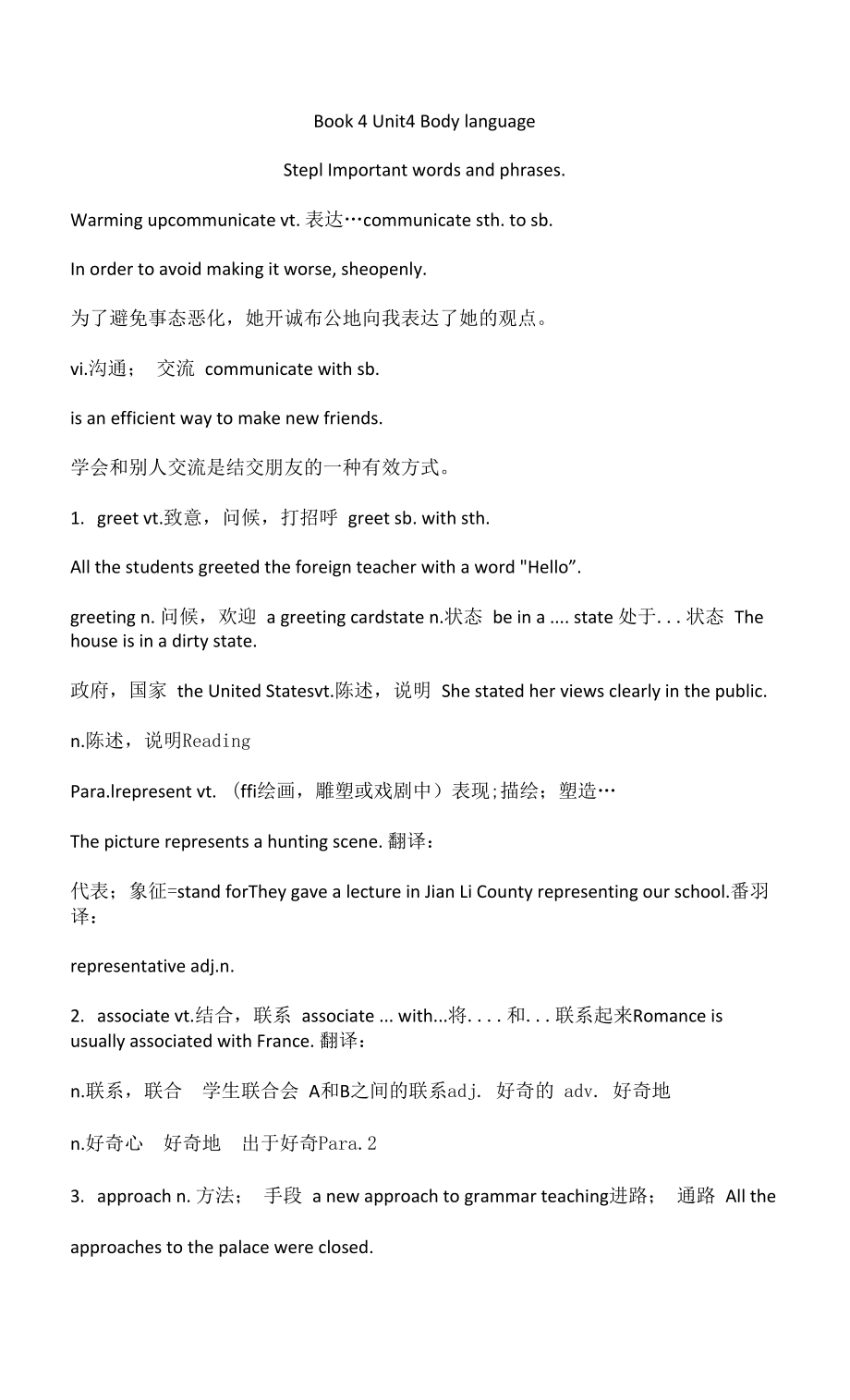《Unit4 language points導(dǎo)學(xué)案 人教版高中英語(yǔ)必修四.docx》由會(huì)員分享���,可在線閱讀��,更多相關(guān)《Unit4 language points導(dǎo)學(xué)案 人教版高中英語(yǔ)必修四.docx(3頁(yè)珍藏版)》請(qǐng)?jiān)谘b配圖網(wǎng)上搜索���。
1��、Book 4 Unit4 Body language
Stepl Important words and phrases.
Warming upcommunicate vt. 表達(dá)…communicate sth. to sb.
In order to avoid making it worse, sheopenly.
為了避免事態(tài)惡化��,她開(kāi)誠(chéng)布公地向我表達(dá)了她的觀點(diǎn)��。
vi.溝通��; 交流 communicate with sb.
is an efficient way to make new friends.
學(xué)會(huì)和別人交流是結(jié)交朋友的一種有效方式�����。
1. greet vt.
2�、致意��,問(wèn)候���,打招呼 greet sb. with sth.
All the students greeted the foreign teacher with a word "Hello”.
greeting n. 問(wèn)候,歡迎 a greeting cardstate n.狀態(tài) be in a .... state 處于...狀態(tài) The house is in a dirty state.
政府���,國(guó)家 the United Statesvt.陳述��,說(shuō)明 She stated her views clearly in the public.
n.陳述����,說(shuō)明Reading
Para.l
3、represent vt. (ffi繪畫(huà)�����,雕塑或戲劇中)表現(xiàn);描繪��;塑造…
The picture represents a hunting scene. 翻譯:
代表���;象征=stand forThey gave a lecture in Jian Li County representing our school.番羽譯:
representative adj.n.
2. associate vt.結(jié)合�,聯(lián)系 associate ... with...將....和...聯(lián)系起來(lái)Romance is usually associated with France. 翻譯:
n.聯(lián)
4����、系,聯(lián)合 學(xué)生聯(lián)合會(huì) A和B之間的聯(lián)系adj. 好奇的 adv. 好奇地
n.好奇心 好奇地 出于好奇Para.2
3. approach n. 方法���; 手段 a new approach to grammar teaching進(jìn)路��; 通路 All the approaches to the palace were closed.
vi.接近�,臨近 .期末考試臨近了。
Vt.接近��,靠近 It is bad manners for English to.
對(duì)于英國(guó)人而言����,靠別人太近是不禮貌的。
4. kiss sb.the cheekdefend vt.防御����,保護(hù)defend.
5、.. against…保護(hù)...免受…傷害
When the dog attacked me, Iwith a stick.
當(dāng)一只狗襲擊我的時(shí)候�����,我拿起一根棍子���,以防它傷害自己�����。
n.保護(hù)�,防御 好像是出于自衛(wèi)major adj.a major misunderstanding
n. (大專院校)主修科目 M y major is English.
vi.主修.... major in ... He majors in Maths and Physics.
para.3dash vi.猛沖,突進(jìn) dash into/to sp.猛沖向某地
dash through the do
6�����、oron the contrary para.4
5. 有可能去做某事 更有可能去做…Para.5
6. 一般來(lái)講=Generally speakingStep2.重點(diǎn)句型
1. The first person (arrive) was Tony Garcia from Colombia,(close)(follow) by Julia Smith from Britain.
第一個(gè)到達(dá)的人是來(lái)自哥倫比亞的托尼一加西亞����,后面緊跟著英國(guó)來(lái)的茱莉 亞一史密斯。
仿句寫(xiě)句:
(l)Neil Armstong是第一個(gè)登上月球的人��。
⑵袁隆平成為第一個(gè)種植出高產(chǎn)量水稻的農(nóng)業(yè)先驅(qū)
7����、。
(3) All the students entered the classroom ,(follow) the teacher.
所有的學(xué)生緊跟著老師進(jìn)了教室����。
The teacher entered the classroom , (follow) by all the students.
老師進(jìn)了教室,后面緊跟著所有的學(xué)生��。
2. These actions are not good or bad, but are simply wayscultureshave developed.翻譯:
The way作先行詞��,其后的定語(yǔ)從句可以用引導(dǎo)�,亦可以仿句寫(xiě)句:
(1) There are many different ways.
人們交流的方式各不相同。
⑵.我不太喜歡你和老師講話的方式���。
 Unit4 language points導(dǎo)學(xué)案 人教版高中英語(yǔ)必修四.docx
Unit4 language points導(dǎo)學(xué)案 人教版高中英語(yǔ)必修四.docx

